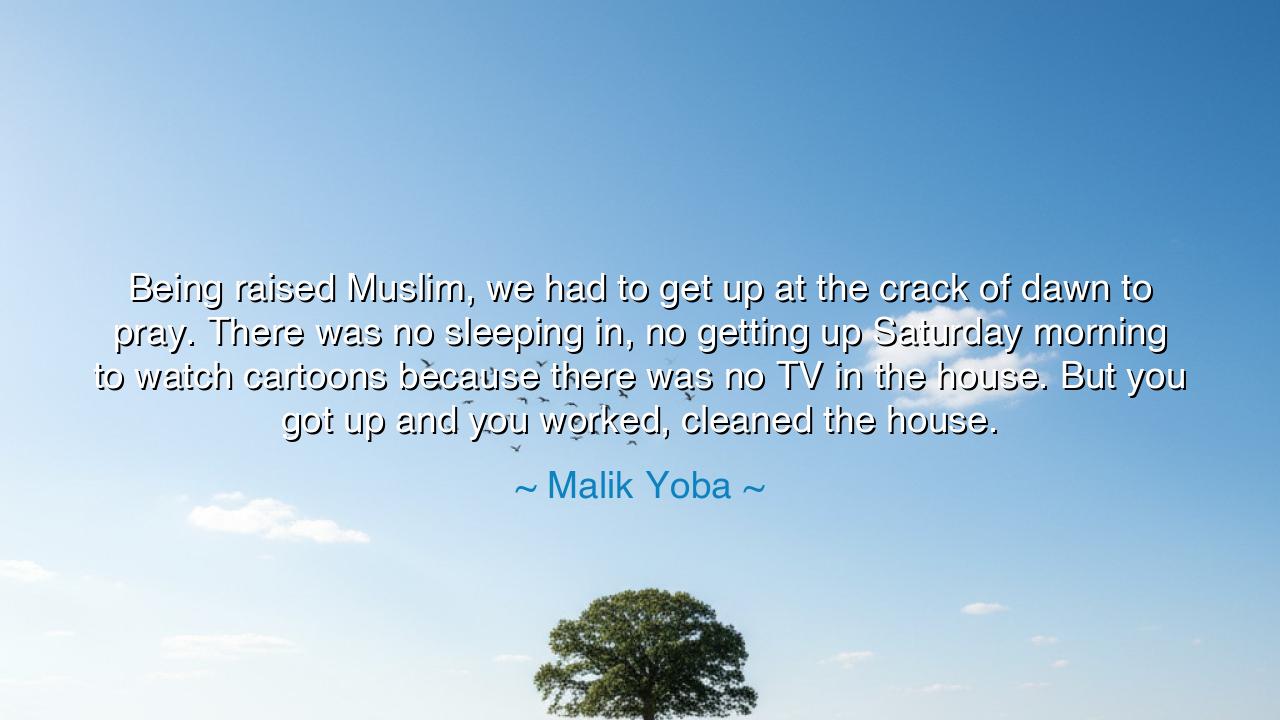
Being raised Muslim, we had to get up at the crack of dawn to
Being raised Muslim, we had to get up at the crack of dawn to pray. There was no sleeping in, no getting up Saturday morning to watch cartoons because there was no TV in the house. But you got up and you worked, cleaned the house.






The words of Malik Yoba echo with the stern rhythm of discipline and the deep wisdom of tradition: “Being raised Muslim, we had to get up at the crack of dawn to pray. There was no sleeping in, no getting up Saturday morning to watch cartoons because there was no TV in the house. But you got up and you worked, cleaned the house.” Though the picture he paints is one of strictness and sacrifice, within it lies a profound truth about the power of routine, the dignity of work, and the eternal call to rise with purpose.
He speaks first of prayer at dawn, the act that set the rhythm of his childhood. To awaken before the sun is not merely to rise early—it is to place the spirit above the flesh, to declare that the first fruits of the day belong not to idleness, but to devotion. The ancients across many faiths understood this: the Romans made offerings at first light, the monks of Christendom chanted their matins before dawn, and the sages of the East greeted the sunrise with meditation. Yoba’s words remind us that to begin with prayer is to anchor the soul before the day’s storms can scatter it.
He contrasts this with the absence of cartoons and television—symbols of distraction and indulgence. In a world where many children grow up lulled by endless entertainment, his upbringing denied him such luxuries. At first glance, this may seem harsh, but in truth it forged resilience. By removing the easy pleasures of the screen, life demanded engagement with the real—the work of the hands, the stillness of prayer, the order of the household. This is a discipline that breeds strength, a reminder that freedom is not found in endless amusement, but in self-mastery.
The command to work and clean the house stands as the heart of his testimony. Labor, often despised, is here embraced as part of life’s sacred rhythm. To clean is not only to care for a dwelling, but to cultivate respect for one’s environment, to learn humility, and to prepare the body for greater responsibilities. History is rich with this truth: George Washington, before he became a general and president, was a surveyor who labored with his hands; the Prophet Muhammad himself herded sheep and worked in trade before his calling. Work is no punishment—it is the soil from which greatness grows.
There is also in Yoba’s words the echo of sacrifice. While other children slept or entertained themselves, he was called to prayer and to labor. Yet this sacrifice is not loss, but gain. For the discipline of youth becomes the strength of adulthood. Those who are trained early in hardship carry within them a well of endurance, while those raised only in ease often falter when trials come. His upbringing was not meant to rob him of joy, but to arm him with resilience.
The lesson for us is plain: structure and discipline are not enemies of happiness, but guardians of strength. To rise early, to tend to the spirit, to work with diligence—these are habits that forge unshakable character. Even if one is not bound by religious tradition, the wisdom remains: to master the morning is to master the self, and to master the self is to master life.
Therefore, children of the future, heed this teaching: do not waste the dawn in idleness, nor drown your youth in distractions. Rise early, feed your spirit, and give your hands to honest labor. For these acts, though simple, are the foundation of greatness. They prepare the soul to endure hardship, to embrace responsibility, and to stand tall when life’s storms come.
Thus, Malik Yoba’s words, born from the strict rhythms of his upbringing, shine as a timeless lesson: the path of discipline is the path to strength. Those who learn to rise, pray, and work when young shall, in the fullness of time, become pillars of endurance and wisdom for all who follow.






AAdministratorAdministrator
Welcome, honored guests. Please leave a comment, we will respond soon